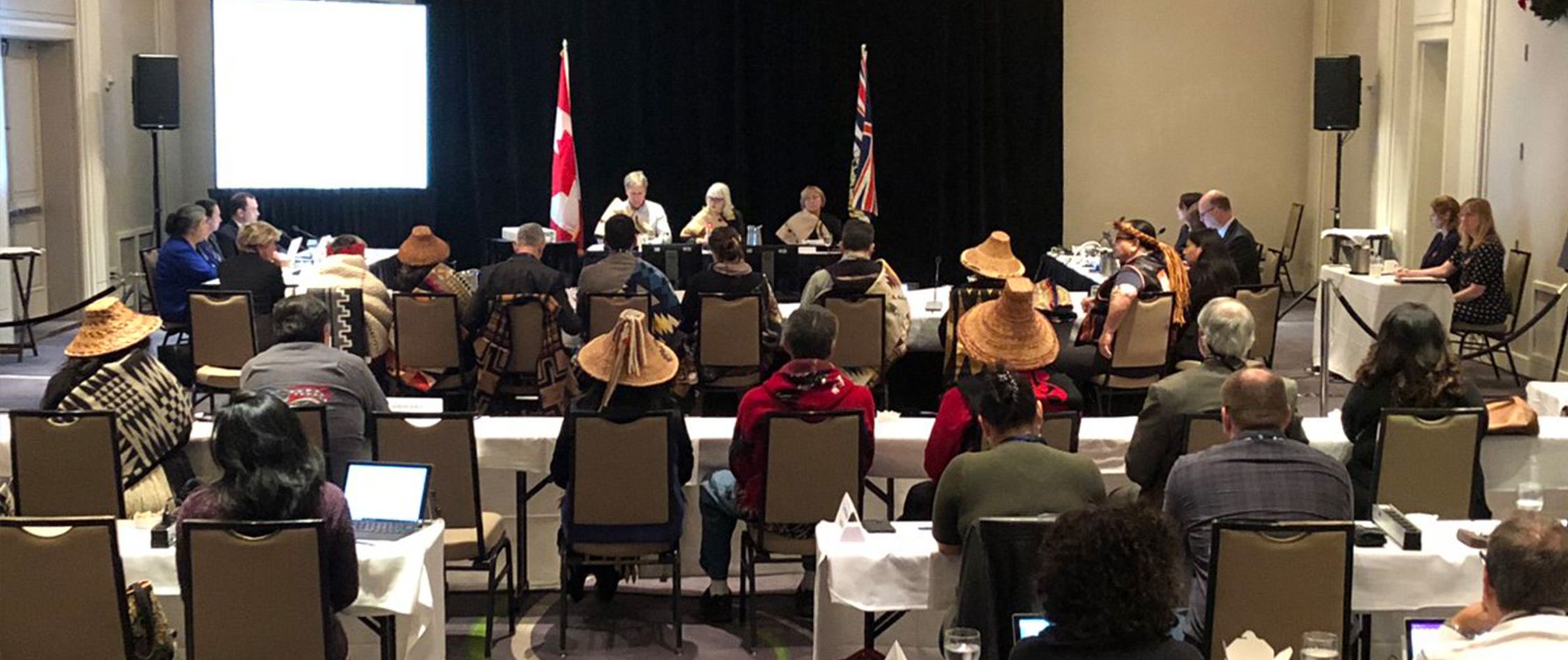Energy Adjudication
The NEB makes decisions or recommendations to the Governor in Council (GIC) on applications, which include environmental assessments, using processes that are fair, transparent, timely and accessible. These applications pertain to pipelines and associated facilities, international power lines, tolls and tariffs, energy exports and imports, and oil and gas exploration and drilling in certain northern and offshore areas of Canada.
The NEB regulates Canada’s federal energy infrastructure over its complete lifecycle. During the design and applications assessment phase of projects, we review and impose conditions. Companies must satisfy the NEB that they are fulfilling the conditions set in application review, and that they are taking every available action to anticipate, prevent, and mitigate any potential harms associated with their activities. When a project has reached the end of its useful life, we review abandonment applications to ensure that it is abandoned in a safe and environmentally responsible manner.
Our Commitment:
Energy adjudication processes are fair, timely, transparent and accessible.
Adjudication Activity in 2018-19:
-
 745
745
Applications Received -
 748
748
Decisions or Recommendations Issued -
 41
41
Oral Indigenous Knowledge Evidence Sessions Held -
 214
214
Participants in Oral Indigenous Knowledge Evidence Sessions -
 More than
More than
$8.5 M
in Participant Funding Awarded
Performance Results – Energy Adjudication
Percentage of adjudication decisions overturned on judicial appeal related to procedural fairness.
- Target 0%
- Results
2017-18 0% - Results
2018-19* 0%
Percentage of surveyed participants who indicate that adjudication processes are transparent.
- Target 75%
- Results
2017-18 88% - Results
2018-19 73%
Percentage of adjudication decisions and recommendations that are made within legislated time limits and service standards.
- Target 100%
- Results
2017-18 100% - Results
2018-19 100%
Percentage of surveyed participant funding recipients who agree that participant funding enabled their participation in an adjudication process.
- Target 90%
- Results
2017-18 94% - Results
2018-19 100%
* AS DISCUSSED IN THE NEXT SECTION, THE FEDERAL COURT OF APPEAL SET ASIDE THE GIC APPROVAL OF THE TRANS MOUNTAIN EXPANSION PROJECT. THE FEDERAL COURT OF APPEAL’S DECISION WAS NOT MADE ON PROCEDURAL FAIRNESS GROUNDS.
Improving Accessibility and Transparency
The NEB is constantly looking for feedback from the public and Indigenous communities on its adjudicative processes. Clarity and transparency of process supports meaningful participation through developing a shared understanding of the review process, and reducing barriers to participation. We use a variety of tools to collect data, including post-hearing surveys, but we recognize that more innovative tools are needed to collect better data to further inform process improvements.
150 separate post-hearing surveys were sent out this fiscal year, with a
32% response rate from participants.
Over 2018–19 we invested in looking at new mechanisms and tools to collect external feedback on our processes and more transparently share information. For example, participant feedback indicates that accessing and finding documents in REGDOCS, the NEB’s online document repository, can be challenging. In response the NEB has partnered with the non-profit group Code for Canada to pilot REGDOCs improvement initiative, aimed at making the information in the repository more accessible to users.
Trans Mountain Expansion Project (TMEP) Reconsideration
In May 2016, after an approximately two-year regulatory review, the NEB issued its recommendation that the Governor in Council approve (GIC) approve the Trans Mountain Expansion Project (TMEP). In November 2016, the GIC approved the Project and related regulatory instruments authorizing the construction and operation of the Project, subject to 157 conditions. Project-related marine shipping was considered as part of that review and report, under the NEB Act – not under the Canadian Environmental Assessment Act (CEAA) 2012.
In August 2018, the Federal Court of Appeal in Tsleil- Waututh Nation v. Canada (Attorney General) set aside the GIC approval of the TMEP. The GIC subsequently directed the Board to conduct a Reconsideration of the TMEP Report within 155 days, taking into account the environmental effects of Project-related marine shipping in view of the requirements of the CEAA 2012, and the adverse effects on species at risk in view of any requirements of section 79 of the Species At Risk Act.
Sable and Deep Panuke Offshore Project Abandonments
The NEB currently regulates two sub-sea pipelines off the coast of Nova Scotia. In March 2018, ExxonMobil applied to abandon the NEB-regulated portions of the Sable Offshore Energy Project, and Encana applied to abandon the NEB-regulated Deep Panuke pipeline and associated onshore facilities, in June 2018. Both projects reached a stage of naturally declining production.
Pipeline Abandonment Funding
At the end of the useful life of a pipeline, companies must apply to the NEB for approval to abandon the facility. The Board conducts a public hearing to consider the views of directly affected parties in determining if and how a pipeline should be abandoned.
Infrastructure, Tolls and Export Applications (ITEA)
The NEB makes decisions and recommendations, which include environmental assessments, on applications to construct, operate, decommission, and abandon pipelines and international and designated interprovincial power lines.
Expected ITEA Program Outcomes…
- Adjudication processes are supported by outreach activities.
- Land matter complaints are resolved in a timely manner.
- Shippers receive pipeline services that meet their needs.
… in support of energy adjudication processes that are fair, timely, transparent and accessible.
Percentage of facility hearings where outreach activities meet commitments.
- Target 100%
- Results
2017-18 100% - Results
2018-19 100%
Percentage of land matter complaints resolved within established service standards.
- Target 100%
- Results
2017-18 100% - Results
2018-19 89%
Percentage of shippers that rate the overall quality of pipeline’s services offering and delivery at three or higher on a five– point scale.
- Target 80%
- Results
2017-18 78% - Results
2018-19 78%
Working with Indigenous Intervenors to Co-develop a Consultation Approach: 2021 NGTL System Expansion Project
NOVA Gas Transmission Limited (NGTL), a wholly owned subsidiary of Trans Canada, filed an application for the 2021 NGTL System Expansion Project in February 2018.
The Project crosses the traditional territory of dozens of Indigenous Peoples. After reviewing the comments received on the proposed hearing process, the Board decided to co-develop a consultation approach, in partnership with Indigenous intervenors.
In December 2018, the NEB announced that it would hold a conference to discuss how Indigenous intervenors could meaningfully participate in this hearing. Participants were asked to provide written comments on specific questions and topics.
The conference was held in January 2019. More than a dozen Indigenous communities were represented and they were joined by staff from three companies, the NEB and Natural Resources Canada.

Alternative Dispute Resolution (ADR): Local Issues, Local Solutions

Hearing processes are not the only way in which the NEB fulfills its mandate to help balance the interests of all Canadians in the stewardship of pipelines and energy development. By the time a company submits an application to the Board, many concerns have already been addressed, but some stakeholders may still have concerns that have not been resolved. In these situations, ADR can be used to help balance different interests or reduce the number of issues that may require adjudication by the Board.
The ADR process can lead to positive outcomes because it provides participants with a way to collaborate on finding solutions, and can be applied specifically to local issues. Landowners, in particular, find ADR beneficial in that it provides them a sanctioned, but more informal forum in which their unique contexts and concerns can be heard. Through ADR, pipeline companies are better able to establish relationships with landowners, communities and stakeholders thus negating potential future conflicts around issues like pipeline maintenance.
84% of land matters complaints were resolved using ADR in 2018-19
Participant Funding Program
The NEB’s Participant Funding Program (PFP) provides funding to facilitate the participation of interveners in hearings with respect to new or abandonment projects for pipelines or power lines and Environmental Assessments of designated projects.
Expected PFP Program Outcome…
Program delivery is timely and efficiently managed.
… to support energy adjudication processes that are fair, timely, transparent and accessible.
The percentage of PFP service standards met.
- Target 80%
- Results
2017-18 100% - Results
2018-19 100%
The percentage of applicants who are satisfied with the service provided by the NEB in its administration of the PFP.
- Target 80%
- Results
2017-18 95% - Results
2018-19 89%
Streamlining Participant Funding Program Applications
The NEB continually refines its PFP processes to provide eligible hearing participants with improved service. Starting with the NOVA Gas Transmission Ltd. – Northwest Mainline Loop (Boundary Lake North Section) in March 2018, the NEB piloted a streamlined PFP application process to reduce burden on applicants and provide funding assurance more quickly. The percentage of applicants who are satisfied with the service provided by the NEB in its PFP remains above target at 89%. This year, funding decisions were provided within eight days of a complete funding application or application deadline, greatly surpassing the 30–day service standard.


